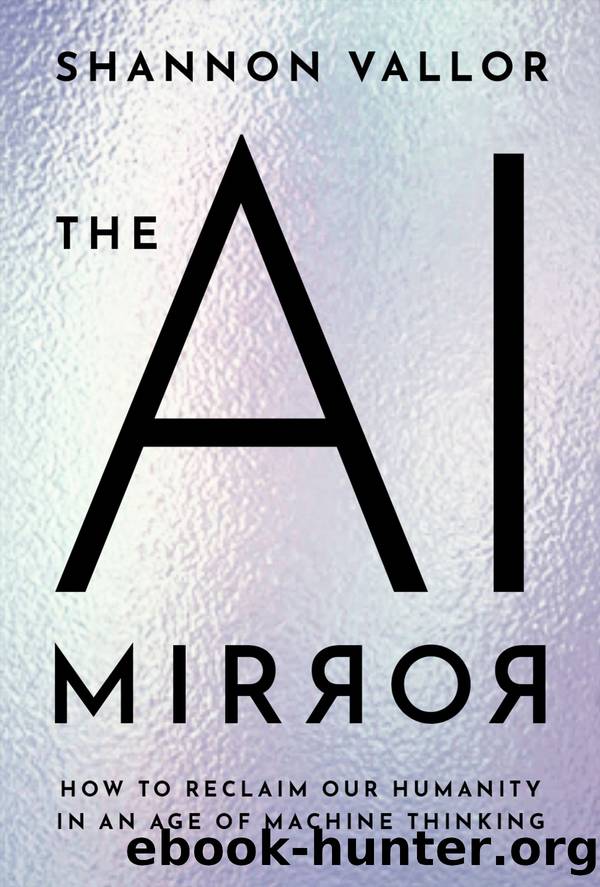The AI Mirror by Shannon Vallor;

Author:Shannon Vallor;
Language: eng
Format: epub
Publisher: Oxford University Press USA
Published: 2024-06-15T00:00:00+00:00
Chapter 5
The Empathy Box
Dost thou know why the mirror (of thy soul) reflects nothing?
Because the rust is not cleared from its face.
âRumi, âMasnaviâ 1:34 (1273 CE)
All technologies are mirrors, because all technologies are extensions of human values into the built world. Every technologyâfrom the wheel, to the book, to the engine, to the computerâreflects what humans of certain times and places thought was worth doing, making, enabling, improving, or trying. Judgments of âworthâ always indicate a human act of valuing, whether or not we are valuing the right things. Even acts of violence can express a value judgment. If I willingly strike you in the face, I am expressing a judgment that at that moment, your personal dignity and well-being are not worth enough to me to command my respectânot valuable enough to warrant me making the necessary moral effort to restrain my rage.
When we gaze in our AI mirrors at the words and images they generate, at the predictions and classifications they make, we are not seeing objective truths, under any definition of âobjective.â We are seeing reflections of what humans valued enough to describe or record in data. But not all humans. What our AI mirrors show are the values of those humans who have historically had the power to shape the dominant patterns now engraved in our recorded data. For example, for most of recorded history, women were largely barred from professional roles that involved authoring books and magazine essays, producing scientific research, writing and directing films, or reporting news stories. While some countries have now opened these roles to women, any large language model trained on a corpus of digitized text that goes back more than a few decades will reflect primarily what men have had to say, and what men have valued enough to bother to describe. The same is true of the corpus of visual art, music, and other domains of culture. And again, these cultural reflections certainly wonât reflect the value judgments of all men, or even most. Most men who have lived on this planet have been economically, racially, or otherwise marginalized in ways that also blocked their contributions to todayâs digitized cultural record of the human family.
The point is that our AI mirrors are nothing like neutral reflections of a shared human reality. They are very potent indicators of how a small subset of humans have seen and valued the world, and the marks they have left on it. For many reading this book, the reflections in AI mirrors will resemble something not too far from your own assumptions and value judgments about the world; what you see in them will be mostly comforting and familiar, even as they surprise and delight you with their power to speak without faces, or to write sonnets without hands. For most others, these reflections have a dimmer cast. Their voices speak a language that is not originally yours, or their patterns retrace a historical arc of devaluation and denigration by other humans who have chosen to see you and your kind as lesser.
Download
This site does not store any files on its server. We only index and link to content provided by other sites. Please contact the content providers to delete copyright contents if any and email us, we'll remove relevant links or contents immediately.
| Drafting & Mechanical Drawing | Fluid Dynamics |
| Fracture Mechanics | Hydraulics |
| Machinery | Robotics & Automation |
| Tribology | Welding |
Whiskies Galore by Ian Buxton(41652)
Introduction to Aircraft Design (Cambridge Aerospace Series) by John P. Fielding(32969)
Small Unmanned Fixed-wing Aircraft Design by Andrew J. Keane Andras Sobester James P. Scanlan & András Sóbester & James P. Scanlan(32639)
Craft Beer for the Homebrewer by Michael Agnew(18026)
Turbulence by E. J. Noyes(7834)
The Complete Stick Figure Physics Tutorials by Allen Sarah(7214)
Kaplan MCAT General Chemistry Review by Kaplan(6738)
The Thirst by Nesbo Jo(6649)
Bad Blood by John Carreyrou(6401)
Modelling of Convective Heat and Mass Transfer in Rotating Flows by Igor V. Shevchuk(6301)
Learning SQL by Alan Beaulieu(6114)
Weapons of Math Destruction by Cathy O'Neil(6000)
Man-made Catastrophes and Risk Information Concealment by Dmitry Chernov & Didier Sornette(5807)
Digital Minimalism by Cal Newport;(5517)
Life 3.0: Being Human in the Age of Artificial Intelligence by Tegmark Max(5319)
iGen by Jean M. Twenge(5255)
Secrets of Antigravity Propulsion: Tesla, UFOs, and Classified Aerospace Technology by Ph.D. Paul A. Laviolette(5174)
Design of Trajectory Optimization Approach for Space Maneuver Vehicle Skip Entry Problems by Runqi Chai & Al Savvaris & Antonios Tsourdos & Senchun Chai(4911)
Electronic Devices & Circuits by Jacob Millman & Christos C. Halkias(4820)
